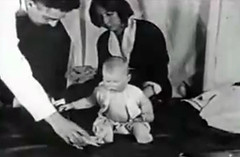AP Psychology terminology that deals with learning.
| 9423769233 | Learning | process by which humans and animals acquire behavior patterns; experience or practice results in a relatively permanent change in behavior or potential behavior; more broad than studying | 0 | |
| 9423769234 | Conditioning | a natural stimulus that evokes a natural response; acquisition of specific patterns of behavior in the presence of well defined stimuli; general term for humans and animals; basic form of learning |  | 1 |
| 9423769235 | Classical Conditioning | expanded by John Watson and Rosalie Rayner; Learning where a response, normally elicited by one stimulus, is taught to respond to another, normally, neutral stimulus; AKA Pavlovian; pairing an involuntary response |  | 2 |
| 9423769236 | Unconditioned Stimulus | US or UCS; a stimulus that causes an organism to respond in a natural manner; in Pavlov's experiment, the meat powder |  | 3 |
| 9423769237 | Conditioned Stimulus | CS; ordinarily a neutral stimulus paired with a unconditioned stimulus to achieve a desired result and eventually produces the desired response in an organism when presented alone; in Pavlov's experiment, the bell |  | 4 |
| 9423769238 | Unconditioned Response | UR or UCR; a natural response that occurs when the UCS occurs, like salivating in Pavlov's experiment |  | 5 |
| 9423769239 | Conditioned Response | CR; a response (after conditioning) that occurs after the CS; in Pavlov's experiment, salivation |  | 6 |
| 9423769244 | Conditioned Food Aversion | AKA taste aversion; discovered by John Garcia by accident during an experiment using rats and radiation; learned association between a food (taste) and nausea/revulsion; avoiding a particular food because it was paired with a bad experience | 7 | |
| 9423769245 | Extinction | a decrease in the frequency of a conditioned response because of a failure to continue pairing the US and CS (in classical conditioning) or withholding of reinforcement (operant conditioning) | 8 | |
| 9423769246 | Spontaneous Recovery | the reappearance of an extinguished response after the passage of time, without further training | 9 | |
| 9423769247 | Stimulus Generalization | the transfer of behavior (learned response) from one stimulus to another stimulus that is similar in nature; in Little Albert's case, Little Albert was afraid of not only white, furry rats but any white and furry objects. |  | 10 |
| 9423769248 | Discrimination | Learning to respond to only one stimulus and to inhibit the response to all other stimuli; when Little Albert was able discern between a white rat and a white rabbit | 11 | |
| 9423769250 | Operant Behavior | expanded by BF Skinner; learning based on rewards or punishment; not automatic reflexes |  | 12 |
| 9423769252 | Shaping | reinforcing successive approximations to desired behavior; example: Skinner box, tiger jumping through a hoop; teaching dog to pee outside, teach a penguin to do a figure 8, driving, etc | 13 | |
| 9423769254 | Negative Reinforcer | the removal of an unpleasant stimulus that increases the likelihood that behavior will continue; is more effective in learning than punishment | 14 | |
| 9423769255 | Positive Reinforcer | a reward; any event whose presence increase the likelihood that behavior will continue |  | 15 |
| 9423769256 | Primary Reinforcer | reinforcer such as water, food, or sex |  | 16 |
| 9423769257 | Secondary Reinforcer | reinforcer whose value allows an individual to acquire other reinforcers like food and water; examples: money, credit cards |  | 17 |
| 9423769258 | Schedules Of Reinforcement | the rule for determining when and how often reinforcers will continue; Four types of schedules: fixed ratio, variable ratio, fixed interval, and variable interval; interval means over a time and ratio means an act; partial reinforcement is on a variable schedule whereas continuous reinforcement is on a fixed schedule; variable schedules are more effective in learning |  | 18 |
| 9423769259 | Punishment | any event whose presence decreases the likelihood that behavior will occur | 19 | |
| 9423769260 | Response Generalization | giving a response that is somewhat different from the response originally learned to that stimulus; when Little Albert responds the same way to a white rat or a white coat | 20 | |
| 9423769261 | Cognitive Learning | impossible to observe and measure; learning that depends on processes which are not directly observable; learning is inferred from the behavior |  | 21 |
| 9423769262 | Latent Learning | pioneered by Edward Chace Tolman; learning that is not immediate in behavior; knowledge that is used when needed, like riding a bike or using a cognitive map |  | 22 |
| 9423769263 | Cognitive Map | example of a cognitive learning; mental image of a spatial environment that is used to problem solve when stimulated |  | 23 |
| 9423769264 | Insight | learning resulting from rapid understanding of all elements of a problem; sudden 'coming together'; an 'A HA' moment |  | 24 |
| 9423769269 | Social Learning Theory | learning by observing without firsthand experience; often used as an argument against violent video games or immoral television shows. |  | 25 |

